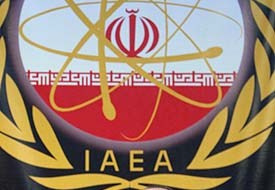
Iran took a tough stance in high-profile talks Monday on the Kremlin's offer to enrich uranium in Russia, seen as a last chance for Tehran to stave off international sanctions. Iran's top negotiator dismissed Russia's call for his country to freeze its domestic enrichment program, and the two delegations ended the day of nuclear talks without any apparent breakthrough. The Russian offer, backed by the United States and Europe, was widely seen as the final opportunity for Iran to address the West's concerns before a March 6 meeting of the U.N.'s International Atomic Energy Agency, which could start a process leading to U.N. Security Council sanctions. Iran defends its right to maintain a domestic enrichment program, which the United States and other Western nations suspect is a cover-up for a weapons program. Iran insists its nuclear activity is solely geared toward generating energy. Russian Foreign Minister Sergey Lavrov said after the talks that Iran should resume the moratorium on uranium enrichment that it broke last month and assuage international concerns about its nuclear activities to avoid Security Council intervention. "To achieve that, it's important for Iran to resume a moratorium on uranium enrichment on its territory and continue contacts between all interested parties to achieve mutually acceptable agreements," Lavrov said. Enrichment is a process that can produce either fuel for a nuclear reactor or material for a warhead. The head of the Iranian delegation in Moscow, Ali Hosseinitash, rejected any link between the Russian plan and demands for Iran to restore a freeze on uranium enrichment. According to Russia's ITAR-Tass news agency, he said Iran did not intend to renounce its right to produce nuclear fuel domestically. Iran's Foreign Minister Manouchehr Mottaki, speaking in Brussels where he met with European Union officials, also reaffirmed Tehran will continue nuclear research even if it accepts Russia's enrichment offer. "If we reach some compromise ... we can continue our cooperation from where we are now," Mottaki said. "It means the research department continues its activity and Russia's proposal is for major nuclear fuel production." But he told the European Parliament's foreign affairs committee that "nuclear weapons are not in Iran's interest." EU foreign policy chief Javier Solana said the talks with Mottaki had failed to resolve Iran's nuclear standoff with the West. In Moscow, the office of Igor Ivanov, the head of Russia's presidential Security Council, issued a terse statement after the closed meeting between Russia and Iran, saying that negotiators had "agreed to continue talks." The Foreign Ministry said the talks will continue Tuesday. Analysts had warned against expecting a decisive outcome Monday, saying that any breakthrough would more likely emerge during Russian atomic energy chief Sergei Kiriyenko's visit to Iran on Thursday. Lavrov said he hopes that the meeting will register "Iran's fulfillment of the IAEA's requests," referring to the nuclear watchdog's efforts to determine whether Tehran has tried to develop atomic weapons. Tensions escalated earlier this month when the IAEA reported Iran to the Security Council. Iran responded by suspending certain aspects of its co-operation with the IAEA - including allowing surprise inspections of its nuclear facilities - and confirmed that it had resumed small-scale uranium enrichment Experts have said Iran would like its scientists to have access to the Russian enrichment facility and hope to retain the right to conduct some part of the enrichment process at home. IAEA chief Mohammed ElBaradei recently suggested that the international community might have no choice but to accept small-scale enrichment in Iran as a condition for Tehran's agreement to move its full program abroad, a diplomat familiar with ElBaradei's thinking said Sunday.
# posted by Free_Iran_Now : Tuesday, February 21, 2006

